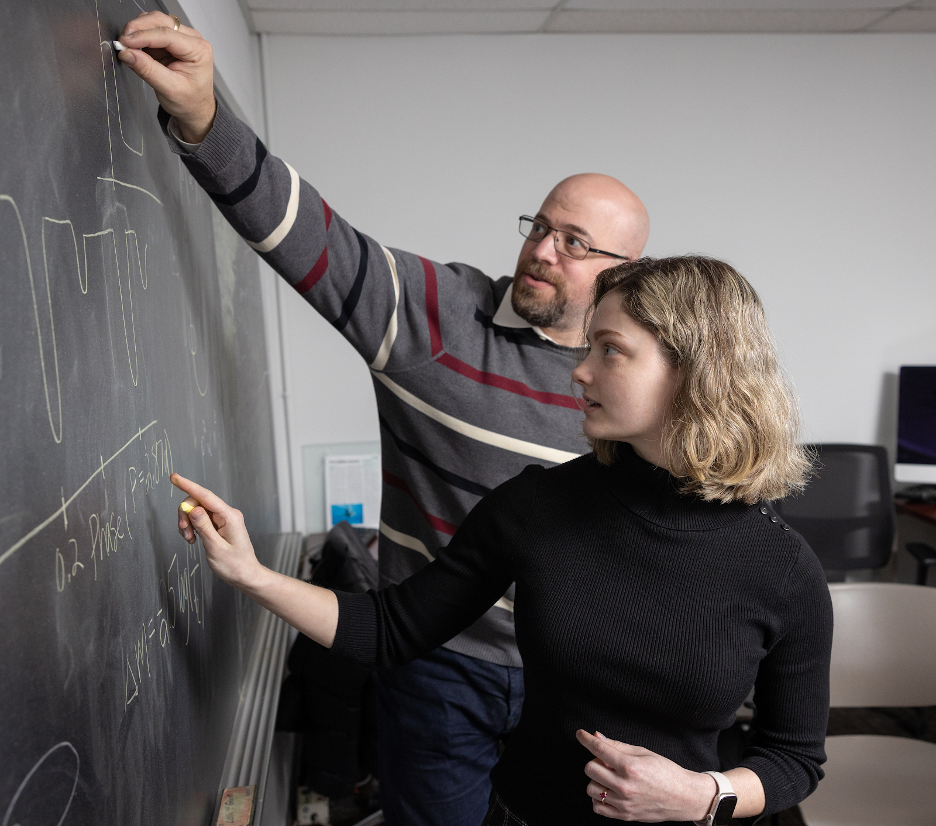Course Catalog
The Lehigh University Catalog lists degree requirements, rules for graduation, and other policies and procedures affecting students at Lehigh University. The University normally updates the Catalog on an annual basis, to reflect changes in course descriptions, degree programs, and academic guidelines. Most policies and procedures, aside from degree requirements, are governed by the language in the current Catalog.
Please refer to the catalog entries for physics and astronomy for detailed information about each course offering.
Spring 2026
Here some new courses for Spring 2026 that are not yet listed in the physics catalog but can be found when browsing for classes. Also, check out the Spring 2026 list for Courses available to First-Year students.
- PHY 095: Discovery: Physics through History and the Modern Age.
CRN: 15026.
This course traces physics from its historical roots to modern discoveries, highlighting the evolution of concepts such as motion, energy, light, matter, space, time, and quanta, and their connections to modern technology. The course is accessible with basic math. Fulfills the Natural Science Encounter (NS) for non-STEM students, the Natural World one (NW), and the Qnatitative Reasoning one (Q). - PHY 391: Gravitational Lensing.
CRN: 14989.
Students will engage with both the analytical foundations and observational evidence for gravitational lensing, the phenomenon where massive objects in the cosmos can act as a lens for light traveling from objects even further away and allow to image them. The course will cover topics such as the lens equation, Einstein rings, time delays, and lensing by planets, stars, black holes, galaxies, and clusters. Through a series of Python-based coding assignments, students will gain hands-on experience with lensing simulations, light curve generation, and modeling. The course will include an independent or group final project combining code, written analysis, and a short final presentation. Projects may involve simulating lensing events, analyzing real data, or modeling lens systems. This course is intended for students who plan to major in physics, astronomy, or astrophysics
Course Syllabi
We provide an archive of all recent physics syllabi that provide more information and details about each of the courses offered by the department.
Overview of undergraduate course offerings
Basic physics courses such as PHY 10, 11, 13, 21 give a quantitative introduction to physical laws and concepts that are essential when working in many areas, from chemistry, to biology, to numerous engineering fields.
PHY 31 and other 100-level courses then provide introductions to quantum mechanics, relativity (PHY 142), and examples of applications (PHY 120, 122) of the physics learned in lower-level courses.
Further courses at 200-level and above go deeper into the same physics that was introduced in lower-level courses (PHY 215, Classical Mechanics, or PHY 340, Thermal Physics; PHY 212-213, Electricity and Magnetism), and then provide new important material (PHY 362 and 369, Quantum Mechanics), or other more advanced topics.
Some of these more advanced courses can be taken by students majoring in other fields to augment their expertise in specific topics or to develop the skills needed for a position in a particular area, as an example by taking PHY 362 and/or 369 (Quantum Mechanics) when interested in a career in quantum information science.
Physics majors that follow the whole program may go on to graduate school in physics, often earning the Ph.D. degree. These graduates take university or college faculty positions, or work on research in a variety of university, government, or industrial laboratories. Other physics majors find employment immediately after the bachelor’s degree, in many different fields that value the problem-solving abilities and background of physics students.
Students may also use the physics major as an excellent preparation for graduate study in many other scientific areas, such as optical engineering, biophysics, astrophysics, geophysics, materials science, or engineering areas such as nuclear engineering, electronics, mechanical engineering, and quantum information sciences.
Lehigh offers three undergraduate degrees in physics and two undergraduate degrees in astronomy or astrophysics. The three physics degrees are the bachelor of arts with a major in physics and the bachelor of science in physics in the College of Arts and Sciences, and the bachelor of engineering physics in the College of Engineering and Applied Science. The B.A. with a major in astronomy and the B.S. in astrophysics are in the College of Arts and Sciences and are described in the Astronomy and Astrophysics section of the catalog.
When majoring in physics in the College of Arts and Sciences It is possible to obtain a bachelor of arts (more free electives and fewer hours for graduation) in alternative to the bachelor of science (which requires somewhat more physics and mathematics) in the college of arts and sciences.
There are also several five-year, dual-degree programs involving physics: The Arts-Engineering program (see the Arts-Engineering section of the catalog), a combination of the bachelor of science program in the College of Arts and Sciences with electrical engineering, and a combination of electrical engineering and engineering physics (see the Electrical Engineering and Engineering Physics section of the catalog). This bachelor of science in engineering physics in the College of Engineering and Applied Science requires an engineering concentration in either solid state electronics or optical sciences, in addition to regular physics and mathematics courses.

